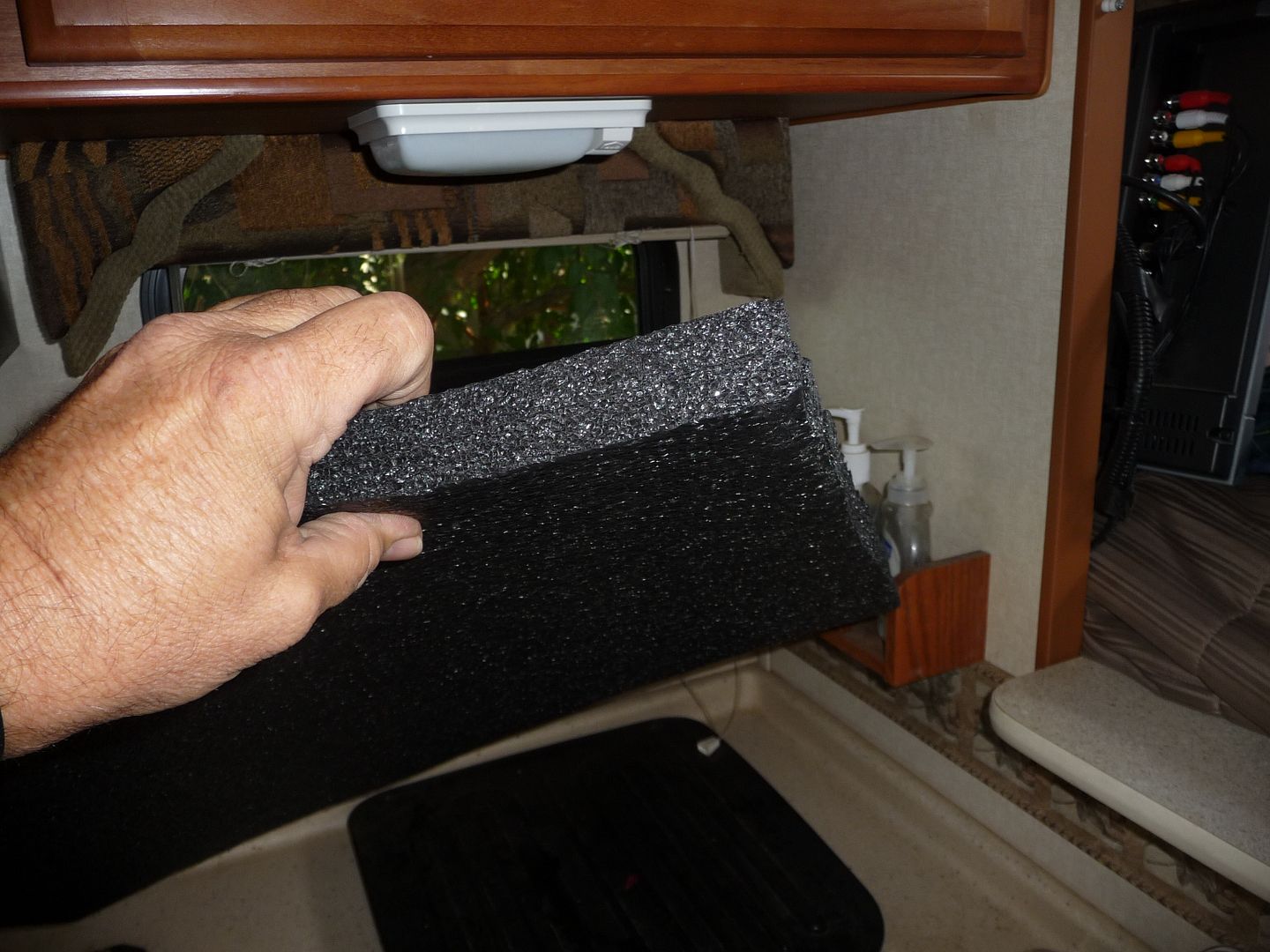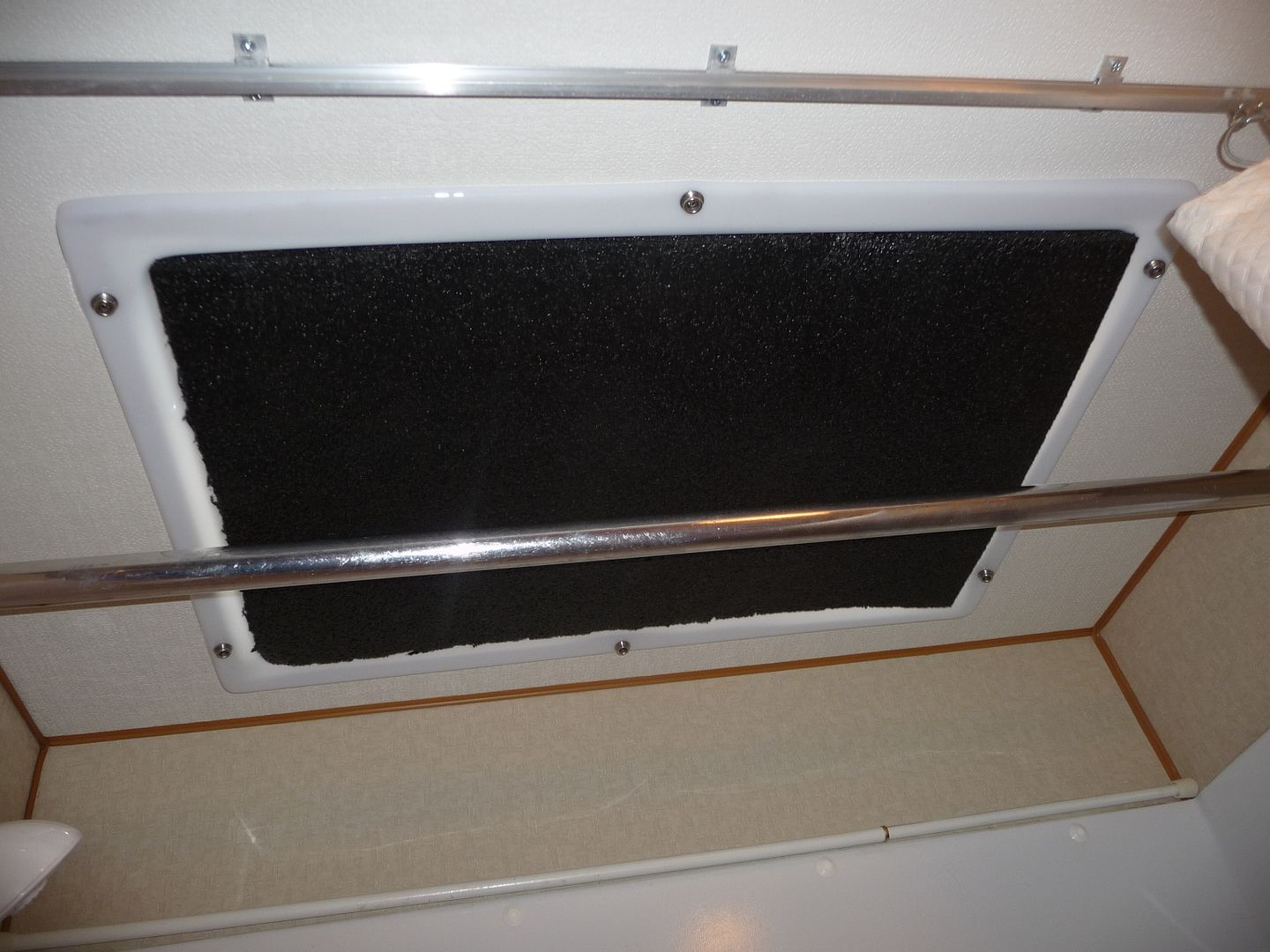Forum Discussion
24 Replies
- Buzzcut1Nomad II
Metaphor 7182 wrote:
Buzz, what type of foam are you using (as shown in the photo)?
its a fairly dense yet lightweight closed cell foam. It Runs $80/ 4x8 sheet from out local foam shop. We originally used it for sound and vibration damping under the stall mats in our horse trailer. - Scott16ExplorerGood Thread and Information. Thanks for all the inputs so far.
Scott - Metaphor_7182ExplorerBuzz, what type of foam are you using (as shown in the photo)?
- Buzzcut1Nomad II
bka0721 wrote:
Buzzcut1 wrote:
Actually, your windows has nothing to do with condensation within an RV. What your steps did was remove the surface temperature variance from the glass surface. The interior space and outside temperatures is what saturates the water molecules that creates a Fog (Dew Point). Just like you see over a lake or in the bathroom, when you shower. The windows just provides a better vehicle for the Water Molecules to gather, drip down and collect in the window tracks.noxinnhoj wrote:
not a big fan of camping when it,s cold.Too much condensation from the windows,,heading to vegas instead,lol
got rid of the condensation problem by covering the windows with foam at night. Before the foam it was wet walls, dripping ceilings at nigh,t after covering the windows, skylights and hatches we were dry as a bone on the Carson river at 16* and in Yosemite covered with snow at 7*
Just like when someone says their battery bank works fine for all their needs, might consider modifying their response, if their heater is running all night with outside temperatures are in the single digits. It is all about use. While I have no knowledge of what Buzzcut did different in this trip, in regards to his previous trip, in regards to use, there was obviously a difference. Exhaling, while Breathing, and using propane is the biggest producers of condensation in an RV. All condensation becomes more noticeable as the outside temperatures plummet. Limiting showering, cooking/boiling water, Catalytic Heaters and wet clothes/boots will decrease your problems with condensation. If you are not seeing condensation, on your windows and or walls, it just means that it has migrated to other places, like the inside of your cabinets. Remember the Fog effect, which is what is happening in your RV, if you could see it, and why it collects from the top down.
By limiting use, that creates water to vaporize, limits the amount of condensation inside a camper, during winter use. For me, I keep a Humidity gauge (Wal-Mart $16) at eye level and just open the door and windows every day, no matter what the outside temperature. By wiping down the windows, ceiling seams and inside cabinets, shower, especially after use, then placing the towel outside to dry, will help minimize cumulative condensation.
Most are weekend/short trip campers, so condensation is not a real issue. But don’t neglect checking your hidden areas (cabinets where clothes as stored) and assume that moisture has not gathered and creating mold. Just like in a tent, if it is touching the walls or ceilings, it is getting wet from condensation, whether there is foam on the windows or not. (JMHO, YOMV)
b
the actual intent of the foam was to provide cold weather insulation as the single pane stock windows provide next to nothing insulation wise in cold weather camping. In that the foam provided exactly what we wanted, the added bonus was the lack of condensation. The reasoning behind it is immaterial it's the results that are useful (not that the information is not nice to know) more warm inside and no condensation plus a major reduction in propane use. Two and a half days of constant heater use plus cooking in temps that hit 37 in the day and 5 at night, with the fridge on propane only used up 2.6 gallons of propane. - bka0721Explorer II
Buzzcut1 wrote:
Actually, your windows has nothing to do with condensation within an RV. What your steps did was remove the surface temperature variance from the glass surface. The interior space and outside temperatures is what saturates the water molecules that creates a Fog (Dew Point). Just like you see over a lake or in the bathroom, when you shower. The windows just provides a better vehicle for the Water Molecules to gather, drip down and collect in the window tracks.noxinnhoj wrote:
not a big fan of camping when it,s cold.Too much condensation from the windows,,heading to vegas instead,lol
got rid of the condensation problem by covering the windows with foam at night. Before the foam it was wet walls, dripping ceilings at nigh,t after covering the windows, skylights and hatches we were dry as a bone on the Carson river at 16* and in Yosemite covered with snow at 7*
Just like when someone says their battery bank works fine for all their needs, might consider modifying their response, if their heater is running all night with outside temperatures are in the single digits. It is all about use. While I have no knowledge of what Buzzcut did different in this trip, in regards to his previous trip, in regards to use, there was obviously a difference. Exhaling, while Breathing, and using propane is the biggest producers of condensation in an RV. All condensation becomes more noticeable as the outside temperatures plummet. Limiting showering, cooking/boiling water, Catalytic Heaters and wet clothes/boots will decrease your problems with condensation. If you are not seeing condensation, on your windows and or walls, it just means that it has migrated to other places, like the inside of your cabinets. Remember the Fog effect, which is what is happening in your RV, if you could see it, and why it collects from the top down.
By limiting use, that creates water to vaporize, limits the amount of condensation inside a camper, during winter use. For me, I keep a Humidity gauge (Wal-Mart $16) at eye level and just open the door and windows every day, no matter what the outside temperature. By wiping down the windows, ceiling seams and inside cabinets, shower, especially after use, then placing the towel outside to dry, will help minimize cumulative condensation.
Most are weekend/short trip campers, so condensation is not a real issue. But don’t neglect checking your hidden areas (cabinets where clothes as stored) and assume that moisture has not gathered and creating mold. Just like in a tent, if it is touching the walls or ceilings, it is getting wet from condensation, whether there is foam on the windows or not. (JMHO, YOMV)
b - covered_wagonExplorer
the tc life wrote:
Why let a snow and cold stop you from getting the camper out. A couple extra steps and its all good. Our next outing is looking like new years eve with the camper. A great way to start the year.
X2.... It's the best time of year, no crowds, less traffic. Snow up on the mountains, beautiful views. Wonderful time of year.
If you are concerned about condensation doesn't it help to head to the dry side of the mountains, the desert? - Oh heck John, whats a little snow in Vancouver? It really doesn't get cold here! I'm in Surrey and the snow is melting fast!
I just spent 5 weeks int he Calgary Alberta area. It got a tad nippy there - some of my days minus 32....
Here is one of my "camping" spots, out back of the shop I was working out of:
- noxinnhojExplorerthanks for the info buzz!!:}
- Buzzcut1Nomad II
noxinnhoj wrote:
I will try your remedy buzz,thanks!!



- noxinnhojExplorerI will try your remedy buzz,thanks!!
About Travel Trailer Group
44,049 PostsLatest Activity: Aug 29, 2025

